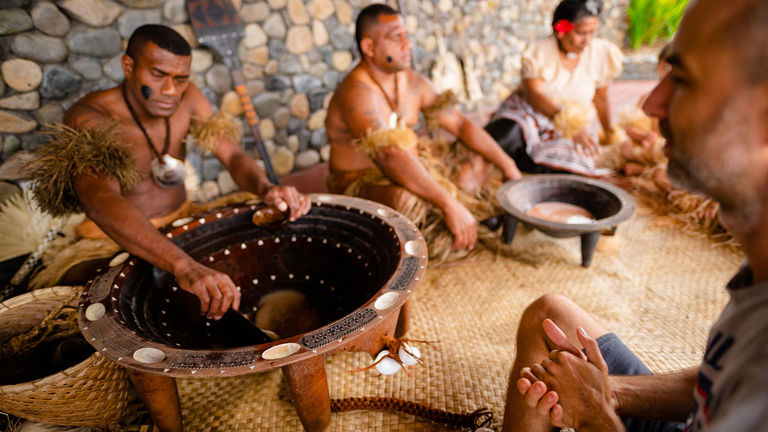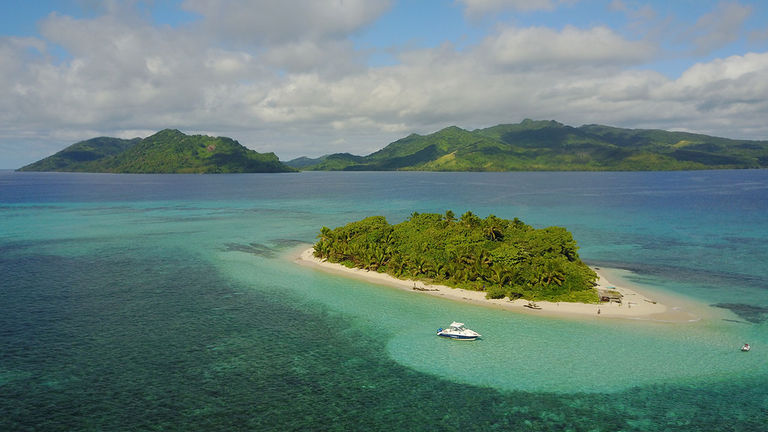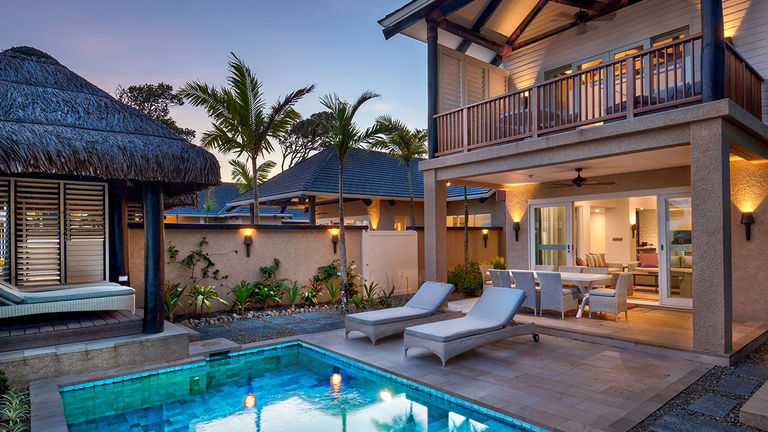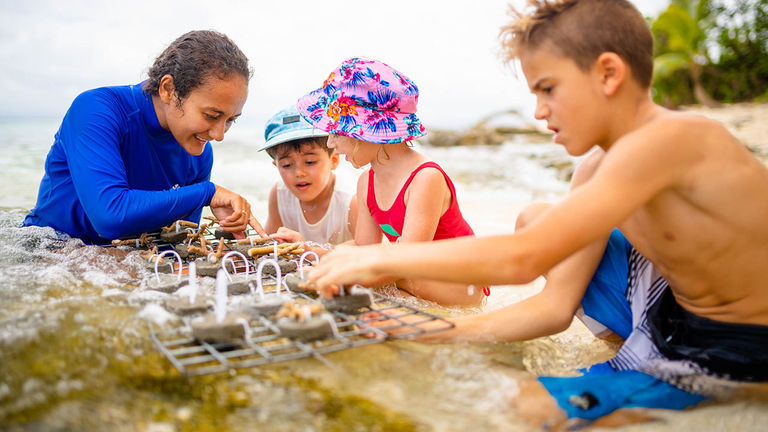Up until recently, I had never cried when leaving a resort.
But after a stay at Nanuku Resort Fiji — as nearly the entire staff gathered around our waiting transfer vehicle, singing songs of farewell and hugging each of us like longtime friends — I can honestly say I teared up.
That genuine warmth (which I’m told is typical of the Fijian people) is on prominent display throughout a stay at Nanuku — and in fact, I’d consider it a distinguishing feature of the property. Not only do staff members forge personal bonds with guests, but they also serve as cultural ambassadors to Fiji, generously sharing their local traditions and way of life on a daily basis. It’s a setup that helps travelers get authentically immersed in Fiji, even if they never leave the property.
Cultural and Natural Immersion: What to Do at Nanuku Resort
Nanuku is located on a 500-acre private estate along the coast of Viti Levu (Fiji’s largest island). It takes a few hours of driving from Nadi International Airport to get there, but as soon as guests arrive, traditionally dressed staff members greet them with a “warrior welcome,” including drumming, the blowing of a conch shell and a refreshing young coconut to sip. From there, it’s off to their accommodations for a private check-in.
After the welcome, each day is packed with more opportunities for cultural discovery. A rotating lineup of staff-led activities and performances (many complimentary) offers a buffet of immersive choices.
 Kava ceremonies hold a special place in Fijian culture.
Kava ceremonies hold a special place in Fijian culture.
Credit: 2023 Nanuku Resort FijiOne of my favorites was the kokoda (a Fijian dish similar to ceviche) and bamboo prawn cooking class. Our instructor, Joshua, first showed the group how to scrape a fresh coconut, and then press its flesh to release the coconut milk. We then used those products in two dishes: the kokoda, and shrimp cooked in bamboo stalks. For the latter, we each received a hollow bamboo stalk to fill with chopped veggies and herbs, before dropping in a few fresh prawns and some coconut milk. The stalks were then sealed with banana leaves and tucked into the embers of a smoldering fire to cook to delicious perfection.
On subsequent days, I watched traditional dance performances, enjoyed live music and tried my hand at weaving leaf crafts, as well as took part in a particularly special opportunity. During a seated kava ceremony, Joshua and other staff members shared the history of the kava drink (made from the pounded root of a local plant), which is often part of formal village ceremonies and family gatherings, and holds a special significance for locals.
But culture isn’t the only thing for guests to indulge in at Nanuku. Thanks to the resort’s prime spread of coastline, there are also countless ways to enjoy pristine Fijian nature.
Complimentary watersports include snorkeling, Hobie cat sailing, stand-up paddleboarding and kayaking. Clients interested in the resort’s focus on sustainability can pitch in by planting mangroves or even coral. For an added fee, guests can go boating or jet skiing, and arrange a variety of excursions, such as a trip to Nanuku’s private island (my vote). On this half- or full-day trip, a short boat ride takes one group of clients at a time to the island, where they can enjoy watersports or simply relax in their own private paradise.
 Guests can visit the resort’s private island.
Guests can visit the resort’s private island.
Credit: 2023 Nanuku Resort FijiIsland Living: Accommodations and Dining
Paradise at Nanuku also comes by way of its villas, residences and suites.
Travel advisors should note a few significant differences between these accommodation types. The seven residences are slightly older, and decorated in a more traditional Fijian style (though refurbishments are expected later this year to modernize the furnishings and interior design). Offering between one and six bedrooms, these sprawling floor plans range from 2,150 to 5,380 square feet. With plenty of living and lounge space, kitchens and large private pools, they are incredible for families or groups. (This part of the resort also features 17 suites of 646-861 square feet, more suited to couples.)
I stayed on the other side of the property, where there are 13 newer villas (opened in 2019), measuring 900 to 1,850 square feet and decorated in a more contemporary style with Fijian accents. Available in one- and two-bedroom layouts (which are single- and double- level, respectively), they either face out to the ocean or feature an enclosed “garden” patio.
 One- and two-bedroom villas (like this two-bedroom garden villa) come with private pools.
One- and two-bedroom villas (like this two-bedroom garden villa) come with private pools.
Credit: 2023 Nanuku Resort FijiMy beachfront one-bedroom was simply stunning: When my “villa mama” (a personal housekeeper assigned to my villa) showed me around, I audibly gasped at the threshold of every room, to her clear delight.
The spacious, light-filled living room and kitchenette (complete with a popcorn maker) opened directly to my huge private patio, outfitted with a cabana, a table and chairs, two loungers and a swinging chair, plus a gate for easy beach access. Oh, and did I mention my private pool? It had a welcoming message written out in rocks, carefully placed on its bottom. Back inside, the separate bedroom led to an extensive bathroom with a double vanity, a giant soaking tub and two showers — one inside, and the other in an outdoor enclave.
Come mealtime, dining takes place at Kanavata Restaurant and Lounge, showcasing Pacific Rim cuisine with an emphasis on fresh seafood and local ingredients, alongside international dishes (such as a curry of the day at lunchtime). Another plus: Breakfast is included in all room rates. And, if clients are after a little something special, book them a “destination dining” experience, in which they can enjoy a private meal in one of a few scenic spots around the resort.
 Kids can plant coral or mangroves as part of the resort's lineup of activities for children.
Kids can plant coral or mangroves as part of the resort's lineup of activities for children.
Credit: 2023 Nanuku Resort FijiAt the end of my stay, I asked Nanuku’s general manager, Logan Miller, how he wants guests to feel during their visit. His response? “Like this is their home away from home.”
All I can say is, mission accomplished.
Why Nanuku Is Fab for Families
Nanuku offers complimentary childcare from 9 a.m. to 6 p.m., by way of a dedicated nanny for each child 0-8 years old, and a “bula buddy” to entertain and supervise older kids of 8-14. The Lailai Kids Adventure Club puts a focus on outdoor activities, with everything from a mini zipline course and a rock-climbing wall to watersports, volleyball, arts and crafts, mangrove planting and more. Kids also get introduced to Fijian culture — there’s even a version of the traditional kava ceremony that subs in chocolate milk for the little ones.